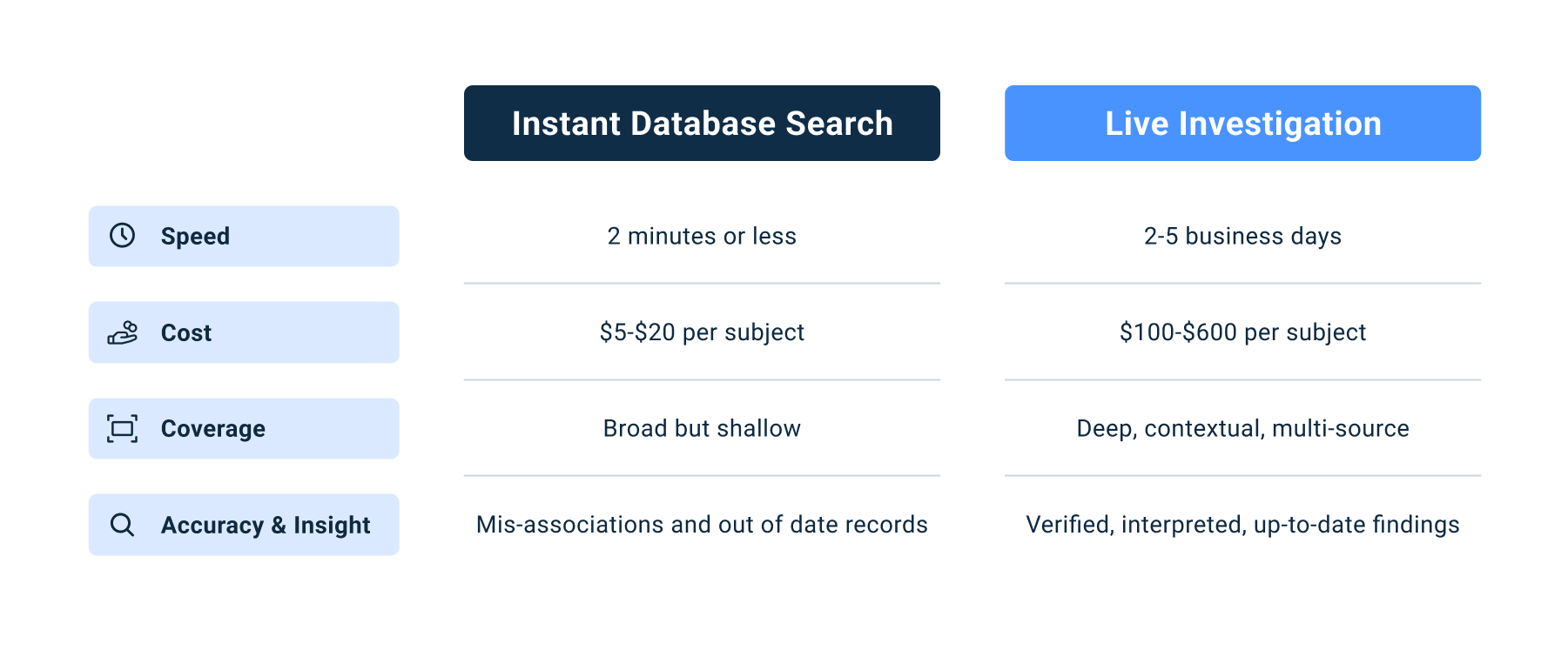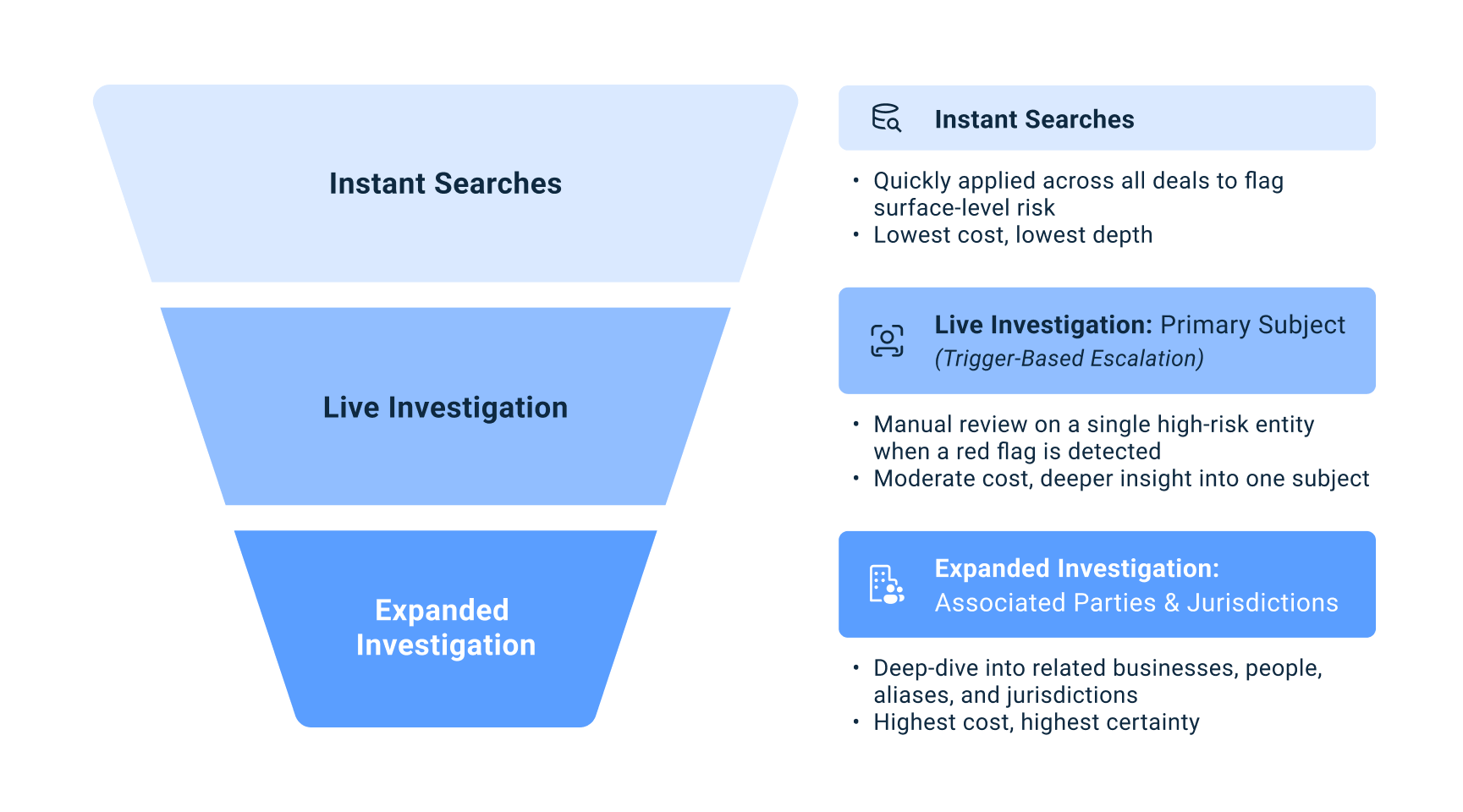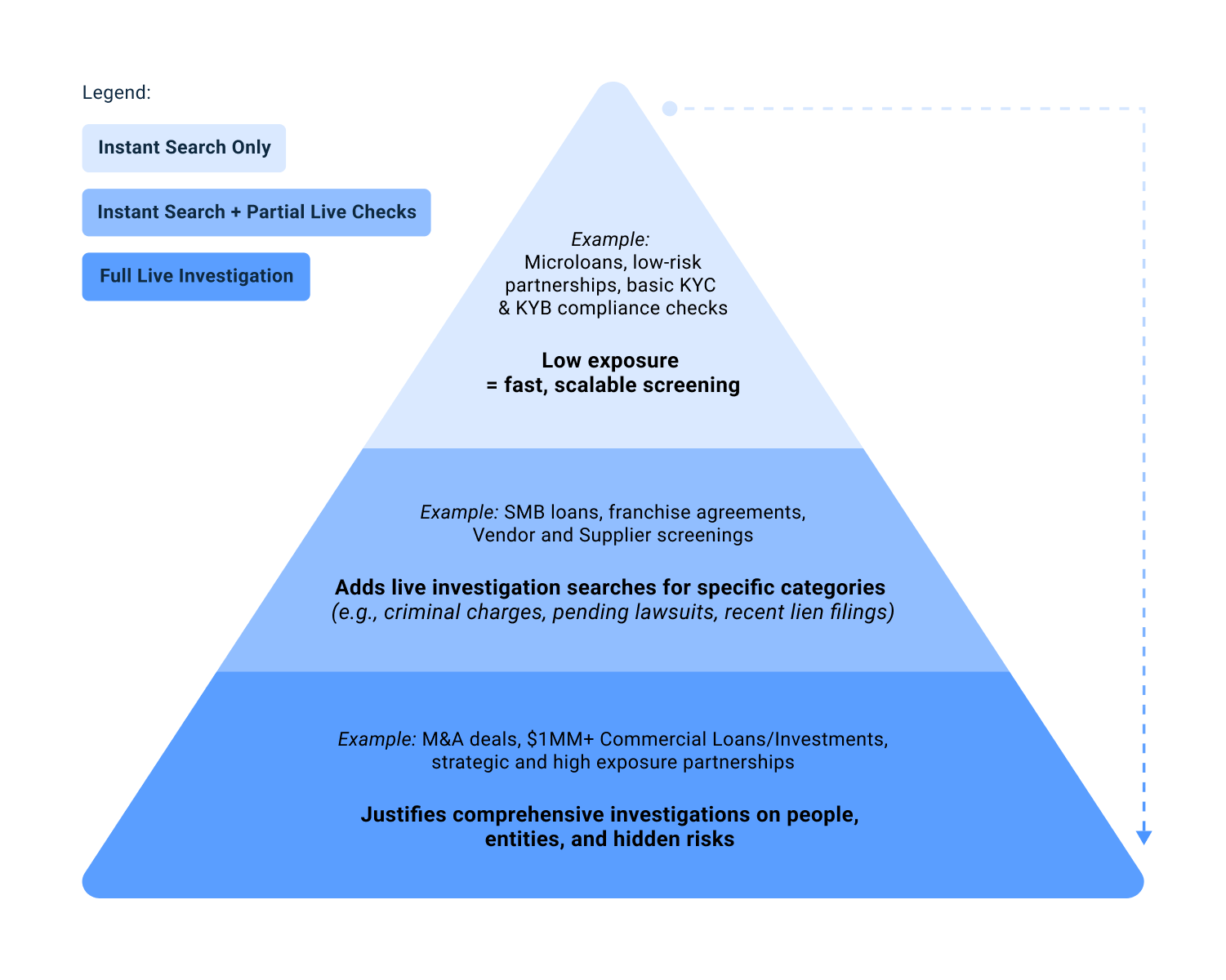
Every deal is bound to warrant a different depth of scrutiny. Some transactions may only need a quick background check, while others call for a thorough investigator-led inquiry. How do you know which approach to take for commercial lending due diligence or investment due diligence? And are you willing to risk the consequences of missing a red flag during due diligence?
In this post, we’ll break down the differences between instant database searches and live investigations, so you can match your due diligence efforts to your deal’s risk level and exposure.
Our goal is to help you balance speed, cost, and coverage, and ultimately protect your interests.
Instant searches are those fast, automated background checks using online databases of public records. These public record database search tools (for example, platforms like Thomson Reuters CLEAR or LexisNexis) aggregate background check data from thousands of sources and let you pull records with a few clicks.
In just seconds, you can screen a company or person for things like criminal records, fraud warnings, sanctions lists, past addresses, or tax liens. The speed and convenience of these database searches is ideal when you have many deals to review and lower individual exposure on each.
However, instant database searches also have their share of downsides.
Here’s an example.
Suppose a mid-market lender was vetting a potential borrower with a clean record on a standard database check. The automated report doesn’t show any liens or judgments.
However, a week after closing the loan, a previously unknown lien surfaced. It had been filed days before funding, but the database hadn’t updated.
The lender could have avoided this situation entirely: a direct check at the county courthouse (a step an investigator would take) would have caught the lien in time. The instant search was fast and cheap, but it missed a critical piece of information that almost jeopardized the entire deal.
The lesson in this? Instant database searches are best suited for high-volume, low-risk situations or as an initial screening filter. If the deal is small or your exposure is limited, a quick public records sweep can provide basic peace of mind. But when more is on the line, it pays to go deeper.
In higher-stakes situations (think a large investment, a major loan, or any deal where you sense elevated risk), it’s time to consider a live due diligence investigation.
Unlike automated searches, live investigations are conducted by experienced analysts or licensed investigators. These professionals dig far beyond what any one database can offer. They verify and expand on the data, checking original sources and uncovering context that a computer might miss.
Live investigations are slower and more costly per subject than instant checks, but they provide thorough, up-to-date information and human insight that can be crucial for high-risk decisions.
An investigator begins by verifying the findings from database searches.
They’ll do things like:
Typically, whenever a deal’s size or risk level makes certainty more important than speed.
Live investigations are essential in scenarios such as:
In short, use live investigations for medium- to high-risk deals, where you need the most current, complete picture of your counterparty.
Live due diligence investigations do require more time and budget. Instead of minutes or hours, a live investigation might take a few days or even a couple of weeks for very complex cases. Professional investigation services can range from a few hundred to a few thousand dollars per subject, but this all depends on depth and scope.
When you weigh the extra time and cost of live due diligence against the cost of not doing enough due diligence, it’s easy to see the value of deep investigations. Ultimately, failed deals, fraud losses, legal liabilities, or reputational damage in the millions.
Consider one investment platform that lost $63 million in deals where their background checks “weren’t enough,” missing earlier red flags about the partner’s legal troubles.
In high-value deals, a live investigation is a prudent investment in risk management, that could prevent multi-million-dollar headaches like the one above.
For an easier side-by-side view, we’ve broken down how instant database searches compare with live investigations based on four key factors:

As the table shows, instant searches win on speed and cost, whereas live investigations excel in completeness and clarity. In practice, many organizations use both: start with the quick search to cover the basics, then escalate to an investigator for anything that merits closer scrutiny.
It doesn’t have to be either/or. In fact, a blended due diligence approach often yields the best balance for mid-market deal makers. This means using instant database screening as a first layer, then adding live investigative checks selectively where risk is higher or when something suspicious comes up.
For most deals, begin with an instant public records search on all key parties (companies, principals, guarantors). This quickly filters out the straightforward cases with no hits, and flags any obvious issues. Consider it your high-volume, low-cost safety net.
Many lenders and equity investors run bulk database checks on every deal in their pipeline to ensure basic compliance (e.g. no OFAC sanctions hits, no glaring criminal history) before proceeding.
If nothing alarming appears, you’ve spent minimal time and money. If a red flag does appear, you now know exactly where to dig deeper. For those areas, focus a live investigation on the areas of concern.

This kind of selective layering allows you to reserve time and budget for where it matters most, while still screening all parties at a base level. It’s a practical way to build more certainty into your higher-risk deals.
A one-size-fits-all background check approach can either waste resources or leave you exposed. The optimal solution is a customized due diligence program that scales with the risk profile of each transaction.
Business Screen’s licensed investigators specialize in creating tiered workflows aligned with your credit policy and risk tolerance. This means we help you define triggers for when to use instant searches versus when to engage deeper investigation, based on factors like deal size, industry risk, and any red flags in a subject’s history.
With a flexible, credit-based service model, you can scale investigations up or down according to volume and need, without getting locked into rigid contracts.
In all cases, you pay only for the level of scrutiny you need, per deal. Due diligence shouldn’t come with a one-size-fits-all price tag or timeline. Our goal is to provide actionable insight (not just raw data) in a way that fits your business workflow.
With your due diligence depth matched to your exposure on each deal, you can move fast on the deals that allow it, and move smart on the deals that require it.

Ready to make sure you’re doing the right due diligence for every situation? Book your free consultation today, and let’s build a due diligence strategy that fits your needs.